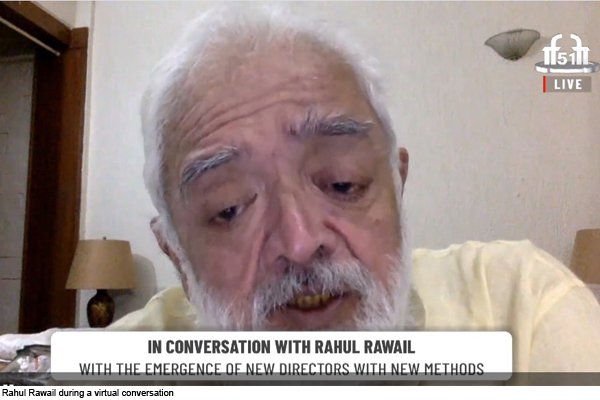New Delhi: The history of Hindi cinema saw the flow of new ideas, new experiments, and a new genre of action films in the 1970s. This was a period which is called the golden year for non-traditional films, as new technology began in Indian cinema during this time.

Filmmaker Rahul Rawal said this during a virtual conversation at the 51st edition of the Indian International Film Festival-IFFI today. He discussed the production of films made in the 50s, 60s, and 70s at IFFI today, with Rahul Rawail discussing with virtual delegates about the amazing journey of the development of the Hindi film industry in the past.
Recalling his cinematic journey, filmmaker Rahul Rawail said, “He started working in the film industry from the late 60s and started his career as an assistant to veteran Raj Kapoor.” He told that, K.K. Artists like Asif and Mahmood made films with superb sets in the 60s, followed by shooting at the location of Baburam Ishara’s film ‘Chetna’ in the 70s within 25 to 30 days, making Hindi cinema A revolution started and it was very extraordinary in those days ”.
Rahul Rawail said that, referring to Vijay Anand’s ‘Johny Mera Naam’ in which Dev-Anand was the lead actor. That film also gave birth to a new form of action-oriented, big-plot films in the 70s. At the time when business was booming in the Hindi film industry, an ‘unconventional hero’ was seen in the 70s film Zanjeer as the character played by Amitabh Bachchan. This put the image of an ‘angry young man’ in front of the audience and then a new brand was established. Rahul Rawail said that in 1973, Nasir Hussain’s film Yaadon Ki Baaraat came, which led to the arrival of the Salim-Javed duo with an excellent script. Raj Kapoor introduced Rishi Kapoor and Dimple Kapadia through ‘Bobby’, the film also started a new trend. He said that “These films were making a change and adding to the whole synergy of film making.” Recalling Rishi Kapoor, Mr. Rawail says, he was a young actor in those days. Film star Jeetendra also appeared on the big screen with a new appeal and new style in the world of Hindi cinema. On this occasion of virtual conversation, Rahul Rawail also remembered the film Wall – a brilliantly made film that took Yash Chopra to great heights in that era. Yash Chopra went ahead with even more memorable films like Trishul.
Rahul Rawail recalled that “In those days there used to be a healthy competition between film stars. Every actor was working very well with each other, but there was no rivalry. “Recalling a funny incident, he told that once upon a time three actors Raj Kapoor, Dev Anand, and Dilip Kumar were in a restaurant. Meet, they came to each other and started talking about each other’s movies and each other’s movies as intimate friends.
Rahul Rawail narrated another interesting story about how the great Sachin Dev Burman had said very politely that it was not right for him to give music for ‘Laila Majnu’ and for this work he recommended Madan Mohan. The music director, the legendary singer, and the songwriter will sit down with the director to make a brilliant film, and the actors will also collaborate with it, which is lip-syncing.
Filmmaker Rahul Rawail had another great film, L.V. Also mentioned V. Prasad’s ‘Ek Duje Ke Liye’, in which a love story was revealed, “where the hero could not speak Hindi and only spoke Tamil while the heroine could only speak in Hindi, she was given Tamil Did not know ”. He said that “people were inventing and doing different kinds of new work”. The audience was also experiencing different types of new films. This was done in the 80s when most of the newcomers came to the cinema, although the old men were still there. The 80s saw the arrival of legends like Subhash Ghai and Shatrughan Sinha. At the time Rawal made the film Arjun, a new trend was started, where the character was paid attention, not to any story. Sharing that memory, Rahul Rawail told that Javed Akhtar had written the script of ‘Arjun’ within 8 hours. Rawal also cast the popular Amjad Khan for the role of a villain in a comedic role. Although many people were skeptical about his decision, Rahul Rawail remembered his mentor Raj Kapoor’s advice that ‘a great script will always work’ and keep going with it.
In the end, Rahul Rawail said that the 70s and 80s were the periods when the Indian film industry had grown a lot and it is still growing.
